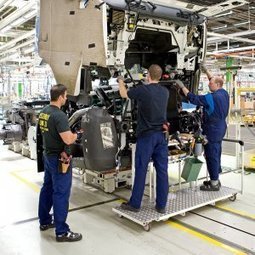Jun 8 2014
What to Expect From a Corporate Lean Program | MIT Sloan Management Review
See on Scoop.it – lean manufacturing

The first author of this article, Torbjørn Netland, is among my favorite bloggers. You can rely on him for good, clear-headed writing based on research. And this article delivers, as expected, but not what its title says. It’s not about corporate Lean programs in general, but all about the case of Volvo. Since I have not seen this kind of disconnect on Torbjørn’s blog, I suspect the title was selected by editors at the Sloan Management Review to broaden its appeal.
A general issue that is not addressed in the article is the level of knowledge of Lean in corporate Lean programs. A company that is just starting in Lean, by definition, has no internal expertise to draw on. If it wants its Lean program to be led by experts, it has to hire them from the outside, which is problematic in two ways:
- It is a challenge at this point for management to recognize real expertise.
- Leaders brought in from the outside have no roots or network in the company.
The alternative is to appoint insiders and expect them to learn. But then it has to be understood that they are not in a position to prescribe what plants should do, and that their role should instead be one of facilitation, coordination, and cross-pollination of ideas between plants.
Often, corporate Lean groups are overeager to standardize the approach across all plants — regardless of what they make or the business and social environment in which they operate.
If they don’t want to turn the Lean program into a exercise in formal compliance, they can instead, for example, on organize periodic conferences where representatives from different plants present their work. They can also arrange for these conferences to be hosted in turns at the different plants and include shop floor visits. And this can be supplemented by various forms of knowledge sharing on the company’s intranet…
There is nothing wrong with collecting the best practices from different plants into a corporate standard, once the different plants have had the opportunity to develop these practices. But if you do it too early, all you do is stifle the creativity that you need for this purpose.
See on sloanreview.mit.edu
June 8, 2014 @ 10:51 am
Michael, I totally agree with your response. I have been trying for years to get management teams to understand – they don’t know that they don’t know.
Ignorance isn’t bliss when trying to implement lean practices, however what is worst is when they try to implement with a limited knowledge which makes them more dangerous. They set the culture from that point in time and for the foreseeable future.
June 8, 2014 @ 3:38 pm
Interesting article- having set up several corporate lean initiatives over the last 15 years I believe the answer is a “give and take” relationship between the corporate group and the needs of the business units directed from the top. There is nothing worse than a group without “teeth”, having said that they also need to add value and help their internal customers. This does require a level of lean expertise, but it is the only real way to make progress in my opinion!